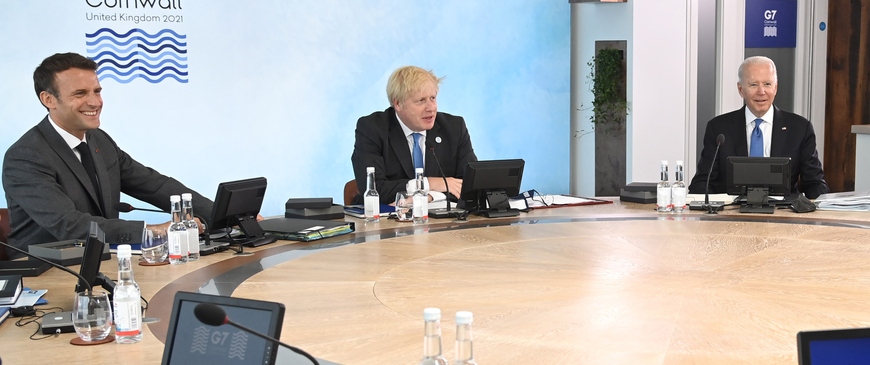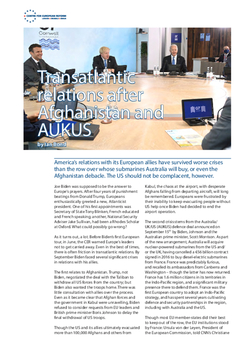
Transatlantic relations after Afghanistan and AUKUS
America’s relations with its European allies have survived worse crises than the row over whose submarines Australia will buy, or even the Afghanistan debacle. The US should not be complacent, however.
Joe Biden was supposed to be the answer to Europe’s prayers. After four years of punishment beatings from Donald Trump, Europeans enthusiastically greeted a new, Atlanticist president. One of his first appointments was Secretary of State Tony Blinken, French educated and French speaking; another, National Security Adviser Jake Sullivan, had been a Rhodes Scholar at Oxford. What could possibly go wrong?
As it turns out, a lot. Before Biden’s first European tour, in June, the CER warned Europe’s leaders not to get carried away. Even in the best of times, there is often friction in transatlantic relations. By September Biden faced several significant crises in relations with his allies.
The first relates to Afghanistan. Trump, not Biden, negotiated the deal with the Taliban to withdraw all US forces from the country; but Biden also wanted the troops home. There was little consultation with allies over the process. Even as it became clear that Afghan forces and the government in Kabul were unravelling, Biden refused to consider requests from EU leaders and British prime minister Boris Johnson to delay the final withdrawal of US troops.
Though the US and its allies ultimately evacuated more than 100,000 Afghans and others from Kabul, the chaos at the airport, with desperate Afghans falling from departing aircraft, will long be remembered. Europeans were frustrated by their inability to keep evacuating people without US help once Biden had decided to end the airport operation.
The chaos at Kabul airport, with desperate Afghans falling from departing aircraft, will long be remembered.
The second crisis stems from the Australia/UK/US (AUKUS) defence deal announced on September 15th by Biden, Johnson and the Australian prime minister, Scott Morrison. As part of the new arrangement, Australia will acquire nuclear-powered submarines from the US and/or the UK, having cancelled a €56 billion contract signed in 2016 to buy diesel-electric submarines from France. France was predictably furious, and recalled its ambassadors from Canberra and Washington – though the latter has now returned. France has 1.6 million citizens in its territories in the Indo-Pacific region, and a significant military presence there to defend them. France was the first European country to adopt an Indo-Pacific strategy, and has spent several years cultivating defence and security partnerships in the region, including with Australia and the US.
Though most EU member-states did their best to keep out of the row, the EU institutions stood by France: Ursula von der Leyen, President of the European Commission, told CNN’s Christiane Amanpour on September 20th that the treatment of France had been unacceptable, and business as usual could not resume until the US had clarified its position.
The third irritant is the Nord Stream 2 gas pipeline from Russia to Germany. Despite rare bipartisan US Congressional consensus that the pipeline would damage European security, in May Biden waived sanctions against some Western companies involved in its construction. In July he struck a deal with German Chancellor Angela Merkel allowing construction of the pipeline to go ahead, in return for German investments in green energy in Ukraine and a promise that Berlin would press for EU sanctions on Russia if it used energy supplies as a weapon against other countries.
Central and Eastern European countries, which had repeatedly tried and failed to get Germany to stop the construction of Nord Stream 2, felt let down by Biden’s deal; some of them wonder why the US has (as they see it) sided with Russia and Germany against the interests of its more loyal allies. As gas prices now rise in Europe, members of the European Parliament have urged the European Commission to investigate whether Russia is limiting gas exports to Europe, contributing to below-average storage levels, which threaten energy cut-offs in the winter.
Biden is old enough to remember earlier crises in NATO, beginning when President Charles de Gaulle withdrew France from the Alliance’s military command structure in 1966 and forced NATO forces and headquarters to relocate from France. NATO has weathered arguments over (among other things) the deployment of intermediate range nuclear missiles in Europe, the reunification of Germany, and the invasion of Iraq in 2003. Biden may be relaxed, thinking that Europe has nowhere else to turn but the US – it will not align itself with China (still less Russia). As Jeremy Shapiro of ECFR wrote in a prescient article in June 2021 about the US administration’s attitude to Europe, “beneath the surface politeness, they pay fairly little attention to European concerns”.
Biden may feel he has already weathered the various storms. Afghanistan is in the rear-view mirror. European and US publics may not like the way the withdrawal was carried out, but no-one is calling for Western troops to go back. The AUKUS row is in the process of being defused: Biden and French President Emmanuel Macron issued a joint statement after a telephone call on September 22nd, in which they “agreed that the situation would have benefited from open consultations among allies”. Biden “reaffirmed the strategic importance of French and European engagement in the Indo-Pacific region”, and “recognised the importance of a stronger and more capable European defence, that… is complementary to NATO” – a phrase that allows France to argue that the EU should do more in the defence field, as long as its efforts also strengthen NATO capabilities. The countries most dismayed that Nord Stream 2 is going ahead are also those who most value the US security guarantee and are most distrustful of any European substitute.
Biden may feel he has already weathered the various storms. Afghanistan is in the rear-view mirror.
It would be a mistake for Biden to be complacent, however. The recent rows have shown that scratchy transatlantic relations and strains among European countries can make it harder for him to achieve his foreign policy objectives elsewhere. In order to concentrate US defence resources against China’s growing military power, he needs to be confident that Europe will remain secure and stable, even if the US reduces its presence. That means encouraging Europeans to invest more in their own defence, take more responsibility for defending their own territory and for stabilising Europe’s neighbourhood, and (since 21 countries are members of both organisations) focus on increasing EU-NATO co-operation rather than arguing over which organisation should be in charge of Europe’s security.
If Biden wants European help to deal with broader challenges from China, including in trade, setting international standards and preventing the transfer of sensitive technologies, he needs to show that he is prepared to listen to European views – including on the undesirability of seeing every issue through the prism of confrontation with China. If Europe feels ignored, it is less likely to be helpful to the US.
Above all, however, Biden needs to ensure that the US does not inadvertently contribute to divisions among European states, and to encourage some (including the UK) to patch up relations with their democratic neighbours. Even as Biden was trying to smooth things over with Macron, British sources were suggesting that the remit of AUKUS could be expanded to broader Indo-Pacific security issues, while still excluding France – an unhelpful idea, in the circumstances. A weak, disunited Europe, unable or unwilling to stand up to pressure from authoritarian states, will demand more US political attention and military underpinning. That is not what Biden needs, when he is trying focus on the Indo-Pacific region.
Ian Bond is director of foreign policy at the Centre for European Reform.

